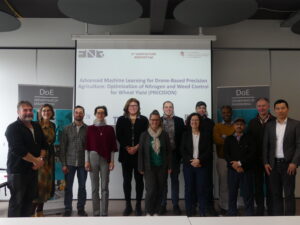The kick-off meeting of the project PRECISION: “Advanced machine learning for drone-based precision agriculture: optimisation of nitrogen and weed control for wheat yield” took place on 22 February 2024 on Kirchberg campus. It gathered researchers from the Department of Engineering at the University of Luxembourg, the Technical University of Munich, and the Institut fir Biologësch Landwirtschaft an Agrarkultur a.s.b.l., teachers from the Lycée Technique Agricole, and representatives from the Ministry of Agriculture, Viticulture and Rural Development, and the Luxembourg National Research Fund (FNR).
Using precision agriculture
Current agricultural practices are responsible for about 30% of global greenhouse gas emissions, biodiversity loss, and nitrogen water contaminations. Precision agriculture is viewed as an approach to make farming more sustainable by employing state-of-the-art technologies and methods from artificial intelligence to collect and analyse agriculture data. For example, very high-resolution data collected during the growing season together with data-driven methods can assist farmers in optimising fertilizer and herbicide applications, leading to a reduced environmental impact, while increasing yield and quality of their produce.
“PRECISION will introduce a novel approach to precision agriculture, with a focus on mitigating the negative impacts of anthropogenic emissions and water pollution, as well as preserving biodiversity and supporting economic viability for farmers in Luxembourg and beyond. To achieve these objectives, we will use advanced technologies onboard of drones and innovative automated methods for timely data analysis. This prepares the path for a future national precision agriculture service available to the entire farming community”, explains Prof. Rebecca Teferle, leader of the project at the University of Luxembourg.
Interdisciplinary collaboration
The project will bring together experts in geospatial engineering, remote sensing and agriculture to investigate the application of Light Detection and Ranging (LiDAR) and hyperspectral imagery (HSI) data together with automated innovative machine and deep learning methods to support farmers to optimize fertilizer and herbicide use at test fields of the Lycée Technique Agricole, the DemoFelder (demofelder.lu), and at conventional and organic farmers.
The project is funded by the Luxembourg National Research Fund (FNR) and the Ministry of Agriculture, Viticulture and Rural Development (MAVDR).
